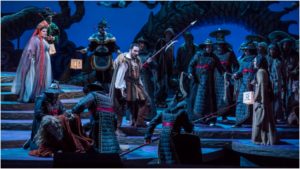
Lyric Opera of Chicago 2017-18 Review – Turandot: Opera At Its Grandest In Puccini’s Final Work
By Santosh VenkataramanStepping into the opera house is almost always about stepping into the past. If that past is a vision of lavishness and grandeur, seeing the current production of Puccini’s “Turandot” at the Lyric Opera of Chicago is emblematic of what anyone would envision as the quintessential operatic experience.
Now that’s not to say that this production, directed by Rob Kearley with sets by Allen Charles Klein, is the greatest “Turandot” ever conceived. It may not even be the equal of the David Hockney production currently in San Francisco that was a mainstay in Chicago since its 1992 debut there. But what can be said about this production is that it’s ideal for those uninitiated with opera to see what is truly a spectacle.
A Problematic Work
The tragic death of the composer that led to the work being finished to the best of Puccini’s intentions by Franco Alfano has always led to Turandot being hotly debated by scholars. It will always pale in comparison to his works penned by Illica and Giacosa, and the question of how the ending should function will never be resolved. That the Chinese characters are treated in a stereotypical fashion certainly not acceptable today creates another layer of doubt as to where “Turandot” ranks in the pantheon of opera.
All of that, while valid, says nothing about the stunning musical merits of the work. To some, borrowing the popular Chinese refrain of Jasmine Flower as a leitmotif may be an indulgent touch; to others, it is the height of genius to meld it into Western culture. I can be convinced in either direction. That Puccini is a genius is reinforced every time by “Turandot,” which showcases the limits of what the voice can achieve.
Not Here for the Setting
Klein’s décor is a conventional dragon-like setting for Beijing with an opulent palace and a huge gong. There’s not much to see here but I didn’t come for the sights. And if there is something to see, it’s how the choristers and supernumeraries appear in and out of the performance as part of an all-encompassing sensory feast.
Michael Black’s chorus has been outstanding all season and that was the case once again with Puccini’s luscious music. The addition of Josephine Lee’s outstanding Chicago Children’s Chorus complemented their adult counterparts and helped bring life to the show.
American Debut
The Italian tenor Stefano La Colla has enjoyed a meteoric rise while emerging onto may of the world’s best stages. This marked his American debut and he has sung his Calaf in Vienna, Milan and Munich among other places. His Lyric debut was billed as one of the seasons highlights.
La Colla is from Livorno, a stone’s throw from the Puccini birthplace of Lucca – both in Tuscany. The lyric tenor proved to be first-rate as advertised with a gleaming, emotive sound. He chose to simplify his mannerisms, letting Puccini’s score highlight his superior voice and technique.
His “Nessun Dorma” at the beginning of Act 3 was underplayed, and I am certain he is capable of much more. The reason may have been because of a minor incident from opening night. I saw the third performance of this run and on the first night, La Colla took a bow after the showpiece aria that was unexpected by many, including conductor Sir Andrew Davis. It’s a move that was also frowned upon as unbecoming at Lyric and La Colla was likely reprimanded.
At the same time, I will defend La Colla in the sense that you have to consider that he is a young Italian singer making his first appearance in the States in the biggest house he has performed in. It was an emotional moment for the tenor and one in which his youthful exuberance got the better of him. So his error was born of enthusiasm, and that’s a quality that should not be stifled. La Colla is exactly the type of international singer that Lyric needs more of – he is set to debut Pollione in Frankfurt this season – and I hope he is welcomed back and all is forgiven.
Diva Shines
Amber Wagner took on the arduous task of Turandot, delivering thrills and exhilaration in a role that she debuted in Vancouver earlier this year. Her vocal heft cannot be questioned as those who recently heard her Elisabeth at the Lyric remember. And she’s hardly a diva since she’s comfortable enough to Tweet to her followers at intermission!
Her highlights were the posing of the three riddles and “In questa reggia.” I believe that she will develop her interpretation of the princess even further with more performances.
Wagner’s duets with La Colla were pleasing to listen to, although the performers behaved like they had never met in terms of their mannerisms. Their voices convinced yet something lacked between them.
The Italian soprano Maria Agresta made her Lyric debut as Liù after a recent run in the same role at the Metropolitan Opera. She dazzled in Act three with her “Tu che di gel sei cinta,” a fitting coda to her night’s work. Veteran bass Andrea Silvestrelli was a workmanlike Timur to round out the principles.
Davis has been conducting everything in sight this season and kept the proceedings at a slow pace. This “Turandot” was an extravagant affair that left patrons, who braved the brutal winter weather, more than satisfied with their decision to indulge.


